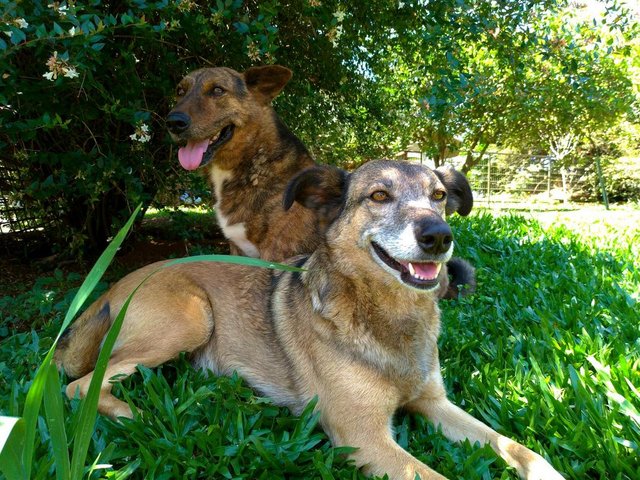Some thoughts about animals/Alguns pensamentos sobre animais (Part 2 of 4)
*There is a english and portuguese version*

English version
(You can read the first part here)
In a first historical moment, in terms of Western society, a form anthropocentrism was born specially in ancient Greece, in which purely mythological explanations were abandoned to give way to reason, especially philosophy. In the following paradigm, with the explosion of Christianity across Europe, theocentrism became the basis for philosophical reflections and other areas of society.
This theocentric view of the world placed God at the center of the Universe, but it also gave people the belief that we were created in the image and likeness of this God, and that is why we were above the other inhabitants of the planet, fauna and flora, and we could do with the planet what would be the best for us, because we are direct children of the Creator.
Therefore, the superiority of the human was justified because it cames directly from God, and nature would be within the reach of our will. This vision does not end completely with the end of this paradigm, since the reborn of anthropocentrism, together with the Renaissance, brought a materialistic way of putting us above the rest of the natural world.
Although concepts like Copernicus's and Galileo's heliocentrism in astronomy already weakened the very anthropocentrism that had just been reborn, the idea of the rational human and the advent of capitalism, and later the Industrial Revolution, germinated in society the idea of nature as a resource to be explored, no longer for an exclusively divine justification, which still remained, but now also an economic justification.
We realize that the human being, at this moment, remains as being above animals and plants, and puts himself in the right to do whatever he wants in the name of his own well-being. The possibility that we see today of animals as subjects of law was not considered, as these were goods to be used as means for ends, objects, or machines, as said by Descartes.
The paradigm shift that we see germinating today, gradually, in a perspective of equality and inclusion of the human being in nature can be credited, at first, to Darwin, who brought us the Theory of Evolution and showed that living beings evolve, species appears, are transformed, are extinguished and no one is privileged or was created by a divine being, but originated from natural processes, and the human being is a small part of the eras of Earth.
In addition to Darwin, Gregor J. Mendel brought us genetics, which, years after his death was taken up by other researchers, developed in the following decades and today gives us the notion that we are not only part of an evolutionary process but also share our genes and we have genes from the most diverse animals, plants and unicellular beings within us, in DNA.
Versão em português
(Você pode ler a primeira parte aqui)
Num primeiro momento histórico, em termos de sociedade ocidental, perceberemos um antropocentrismo greco-romano, onde abandonaram-se explicações meramente mitológicas para dar lugar à razão, especialmente a filosofia. Já no paradigma seguinte, com a explosão do cristianismo pela Europa, um teocentrismo tornou-se a base das reflexões filosóficas e demais áreas da sociedade.
Esta visão teocêntrica de mundo colocou Deus como centro do Universo, mas também deu às pessoas a crença de que fomos criados à imagem e semelhança deste Deus, e por isso estávamos acima dos demais seres habitantes do planeta, seja fauna ou flora, e poderíamos fazer do mundo nosso “jardim”, pois somos filhos diretos do Criador.
Justificava-se, portanto, a superioridade do humano por este vir diretamente de Deus, e toda a natureza estaria ao alcance das nossas vontades. Esta visão não se encerra por completo com o fim deste paradigma, pois o retorno do antropocentrismo, junto com a Renascença, trouxe uma forma materialista de nos por acima do restante do mundo natural.
Embora conceitos como heliocentrismo de Copérnico e Galileu na astronomia já enfraquecessem o próprio antropocentrismo que acabara de renascer, a ideia do humano racional e o advento do capitalismo, e posteriormente da Revolução Industrial germinou na sociedade a ideia de natureza como um recurso a ser explorado, não mais por uma justificativa exclusivamente divina, que ainda se mantinha, mas agora também uma justificativa econômica.
Percebamos que o ser humano mantém-se, neste momento, como ser acima dos animais e das plantas, e coloca-se no direito de fazer o que bem entende em nome do próprio bem estar. Não se considerava a possibilidade que vislumbramos hoje de animais como sujeitos de direito, pois estes eram bens a serem usados como meios para fins, objetos, ou máquinas, como disse Descartes.
A mudança de paradigma que vemos germinar hoje, paulatinamente, numa perspectiva de igualdade e inclusão do ser humano na natureza pode ser creditado, num primeiro momento, a Darwin, que nos trouxe a Teoria da Evolução e mostrou que os seres vivos evoluem, espécies surgem, se transformam, são extintas e nenhuma é privilegiada ou foi criada por um ser divino, mas originou de processos naturais, e o ser humano é uma parte minúscula das eras de transformação e mudança da vida na Terra.
Além de Darwin, Gregor J. Mendel nos trouxe a genética, que, anos após sua morte foi retomada por outros pesquisadores, desenvolvida nas décadas seguintes e nos dá hoje a noção de que não só fazemos parte de um processo evolutivo como também compartilhamos nossos genes e temos genes dos mais diversos animais, plantas e seres unicelulares dentro de nós, no DNA.
Conheça: | @brazine | @brazilians | @camoes | @coiotes | @imagemvirtual | @msp-brasil | @ptgram-power |
Parabéns, seu post foi selecionado pelo projeto Brazilian Power, cuja meta é incentivar a criação de mais conteúdo de qualidade, conectando a comunidade brasileira e melhorando as recompensas no Steemit. Obrigado!
Downvoting a post can decrease pending rewards and make it less visible. Common reasons:
Submit